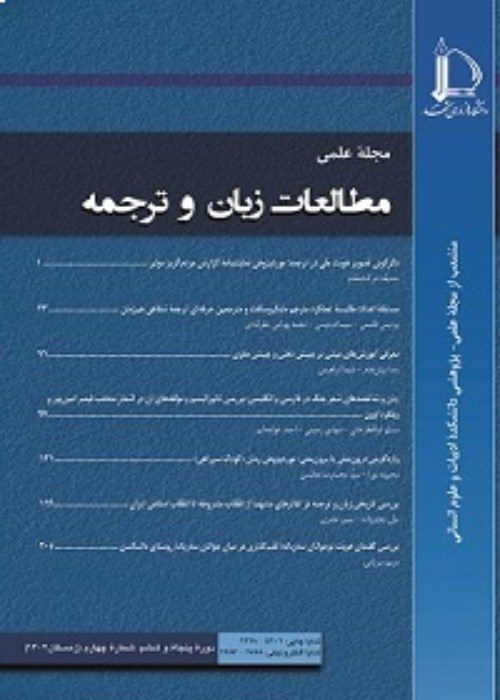dsfgdfg.U/mdg
Author(s):
Article Type:
Research/Original Article (دارای رتبه معتبر)
Abstract:
Introduction
Discourses and theories are produced in different ways, whether they are produced within the borders of a culture, or imported from a different culture through the channel of translation or other forms of rewriting (e.g. original writing on the imported discourse). In Iran, many modern discourses and theories are products of different types of translations. This does not mean that some elements of these discourses have not been previously present in Persian literary and philosophical works, but it means that such discourses and theories as coherent sets of knowledge, philosophy and theory and with a specific purpose and worldview are products of translation and importation from different cultures. However, few historical studies have been carried out in this regard and even in those few studies the role of translation in introducing new discourses has been totally ignored.
Theoretical framework:
The present study aimed to use, as Bandia (2006) suggests, the current theories and methodologies which are developed in the field of history. Thus, among the current theories, Reception Theory, proposed by Jauss (1970), has been suggested and modified to account for the way modern discourses in Iran are received.Following Rundle's (2012) distinction between historical and scientific methods in historical translation studies, the present study aimed to avoid yielding a general account of the role of translation in the immigration of theories and discourses and instead focused on the history of the reception of modern discourses in Iran with a focus on the role of translation among other forms of rewritings. Thus, as Rundle (2012) suggested the results may interest a wider range of audience, historians as well as translation studies scholars.
Discussion
The present paper sought to emphasize the transfer of contemporary discourses as an important area in Historical Translation Studies in Iran and suggested it be an essential area for research among Translation Studies scholars in Iran. To this end, first, some of the ideas on the transfer of discourses and the current discussions in the field of historiography were briefly reviewed, and then an attempt was made to adapt Jauss's (1970) Reception Theory to the needs of Historical Translation Studies scholars interested in studying the transfer of discourses.
Conclusion
Considering the importance of translation in the transfer and development of contemporary discourses, this paper attempted to propose a historical approach to address the issue of the transfer of contemporary discourses in Iran. Adopting a historical approach helps us avoid imposing a pre-existing theory on the data, and thus emphasizes the specific characteristics of the transfer of each discourse. In addition, the emphasis put on using the “Reception Theory” distinguishes it from similar approaches to the problem of the transfer of discourses which seek to examine the impact of imported discourses on the target culture.Keywords:
Language:
Persian
Published:
Language and Translation Studies, Volume:50 Issue: 4, 2018
Pages:
1 to 24
magiran.com/p1919264
دانلود و مطالعه متن این مقاله با یکی از روشهای زیر امکان پذیر است:
اشتراک شخصی
با عضویت و پرداخت آنلاین حق اشتراک یکساله به مبلغ 1,390,000ريال میتوانید 70 عنوان مطلب دانلود کنید!
اشتراک سازمانی
به کتابخانه دانشگاه یا محل کار خود پیشنهاد کنید تا اشتراک سازمانی این پایگاه را برای دسترسی نامحدود همه کاربران به متن مطالب تهیه نمایند!
توجه!
- حق عضویت دریافتی صرف حمایت از نشریات عضو و نگهداری، تکمیل و توسعه مگیران میشود.
- پرداخت حق اشتراک و دانلود مقالات اجازه بازنشر آن در سایر رسانههای چاپی و دیجیتال را به کاربر نمیدهد.
In order to view content subscription is required
Personal subscription
Subscribe magiran.com for 70 € euros via PayPal and download 70 articles during a year.
Organization subscription
Please contact us to subscribe your university or library for unlimited access!


